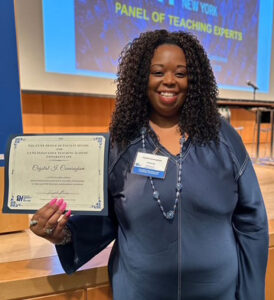April 10, 2025
 English Department Professor Crystal I. Cunningham presented her talk and interactive presentation, “Revisiting Baldwin’s ‘A Talk to Teachers’: Empowering Educators with Antiracist Pedagogy in Diverse Classrooms,” at the CUNY Teaching and Learning Conference on April 4 at the CUNY Graduate Center.
English Department Professor Crystal I. Cunningham presented her talk and interactive presentation, “Revisiting Baldwin’s ‘A Talk to Teachers’: Empowering Educators with Antiracist Pedagogy in Diverse Classrooms,” at the CUNY Teaching and Learning Conference on April 4 at the CUNY Graduate Center.
Professor Cunningham’s presentation was one of just three submissions chosen out of a competitive field of 130 for the Panel of Experts session. Her talk engaged and inspired attendees with innovative insights that promote pedagogical excellence and transform the lives of students.
Professor Cunningham was also presented with an award from the CUNY Office of Faculty Affairs and the CUNY Innovative Teaching Academy, congratulating her on being named a CUNY Teaching Expert.
Professor Cunningham explains how her presentation’s subject matter resonates with the ongoing struggle for racial justice and equity in education, particularly in the context of library book bans—primarily targeting authors of color—and the silencing of African American history. She says it is crucial for educators to advocate for the inclusion of diverse narratives in curricula because diverse stories matter.
“Denying our students access to Black Studies not only undermines the legacy of countless patriots of the civil rights movement but also grants an honorable discharge to the vital teachings and sacrifices of many historical figures,” said Professor Cunningham. “Furthermore, it dismisses the crucial desire for change articulated by James Baldwin. It is imperative that we honor their contributions and ensure that future generations learn from their struggles and triumphs. As educators, we need to share knowledge, integrate diverse voices and perspectives into our curriculum, and continually think about how to support our learners’ self-esteem.”
During the speech at the CUNY conference, she said she sought to highlight the importance of creating a classroom environment where all students feel valued and seen. This inclusive atmosphere not only fosters learning but also encourages students to express themselves and engage more fully in their education, Professor Cunningham explains.
“One of the key takeaways I hope audience members grasp is the significance of fostering empathy and trust in the learning space,” said Professor Cunningham. “Students have expressed appreciation for my efforts to incorporate diversity into our discussions, emphasizing, ‘Your teaching stands out to me due to your strong commitment to engagement with the class and your ability to create an inclusive classroom environment where all students feel heard.’”
“I had a student who is an active learner, but one day he was withdrawn and struggled to submit an assignment,” said Professor Cunningham. “By reaching out and offering support, I not only helped him academically, but he also told me that I created a ‘safe space’ in my classroom for him to express his feelings. This aligns with Baldwin’s vision of education as a sanctuary for learning and growth. It is this sense of safety that encourages students to participate actively, engage in critical conversations, and challenge themselves intellectually.”
During her presentation, Professor Cunningham stressed the importance of implementing antiracist pedagogy in the classroom. She and her CUNY colleagues then engaged in a discussion where she posed the question: “How can you cultivate an intelligent and sensitive approach in the classroom that aligns with antiracist pedagogy?”
“As Baldwin said, we, as educators, need to ‘go for broke,’” said Professor Cunningham. “This means we need to continue our work toward an antiracist curriculum. When you teach students, you must realize they come from all walks of life. We, as educators, need to think about our students’ experiences and lifestyles and be ready to create a classroom environment that sparks interest, engagement, and a passion for learning.”
The most powerful words that resonate with Professor Cunningham are when Baldwin writes: “To be intelligent and sensitive at the same time is to be in a state of constant tension.”
“This quote encapsulates the delicate balance we must strike in our pursuit of knowledge and empathy,” said Professor Cunningham. “We are big—we wield so much power as teachers—and we need to be sensitive, finding ways to deliver an education that makes our students feel big with us. Baldwin challenges us to embrace the tension, urging us to navigate the complexities of our identities and experiences while remaining attuned to the struggles of others.”
“I hope my presentation at the CUNY Teaching and Learning Conference not only inspired my peers to reflect on their teaching methods but also motivated them to create environments where students from all walks of life can thrive,” said Professor Cunningham. “I once saw a message scrolling across a monitor while I was waiting for the train on a platform: ‘It takes a village to tell a story.’ We can be a BMCC village and help tell stories that are diverse and connect with students on a deep intrinsic level, making them aware of their surroundings while incorporating empathy, trust, and critical thinking.”
Educators have a responsibility to uplift students and empower them to succeed, explains Professor Cunningham.
“By cultivating an atmosphere of respect and understanding, we can help our students feel significant and valued, which is essential for their growth and self-esteem,” she said.
Learn more about the CUNY Teaching and Learning Conference here.
- Professor Cunningham says “we can be a BMCC village and help tell stories that are diverse and connect with students on a deep intrinsic level.”

